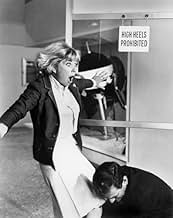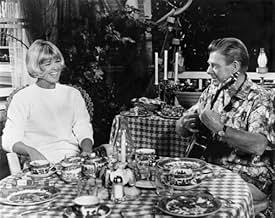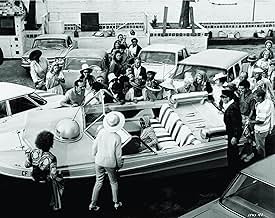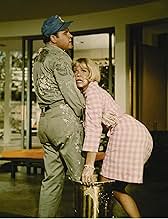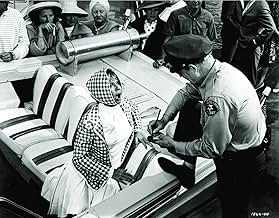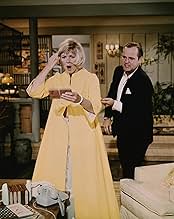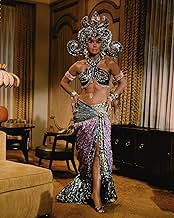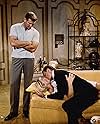Tras una serie de malentendidos, el director de un laboratorio de investigación aeroespacial empieza a sospechar que su nueva novia es una espía rusa.Tras una serie de malentendidos, el director de un laboratorio de investigación aeroespacial empieza a sospechar que su nueva novia es una espía rusa.Tras una serie de malentendidos, el director de un laboratorio de investigación aeroespacial empieza a sospechar que su nueva novia es una espía rusa.
- Premios
- 1 nominación en total
- Julius Pritter
- (as Dom De Luise)
- Party Guest
- (sin acreditar)
- Executive
- (sin acreditar)
- Party Guest
- (sin acreditar)
- Party Guest
- (sin acreditar)
Reseñas destacadas
The film is loaded with space-age gadgets. Taylor's computerized, motorized kitchen is great, complete with a floor-cleaning robot - wonder if the inventors of today's robot vacuum saw this movie. He also pilots his boat via a remote - but as he points out during a scene where the boat runs amok with Day inside, that needs further work.
There's lots of slapstick and comedy support from Dom Deluise, Dick Martin, and Paul Lynde. Lynde, by the way, looked great in drag, and has some great delivery in his scenes. Some of the scenes, especially those of Deluise, had an improv feel. The late Eric Fleming, Clint Eastwood's boss on "Rawhide," plays a CIA man. This was his last film; he drowned shortly afterwards. Rod Taylor, who, by the way, is younger than Doris Day, is effective as Day's romantic interest. Of note, radio personality Arthur Godfrey plays Day's father. There's also an appearance by Robert Vaughan as an homage to his "Man from UNCLE" character.
Frothy fun, and Doris Day is always a delight.
This film has a wonderful use of color, an admirable pacing and a freshness rarely seen in the studio comedies of the time (the singing scene in the boat looks totally improvised). But if Tashlin's background as a cartoonist often contributes to his creative ability to take situations beyond the edge, and to destroy a stiff established order, very seldom this very quality can work against him. And this is what happens with all the bad guys in this film. They are a mere caricature, and one can never feel them as a serious threat. The theme demanded something more serious, and these clumsy amateurs certainly fail.
Anyway, watch the film and sing the title's tune; it'll remain with you for ages.
Doris Day in her heyday couldn't do anything wrong, in spite of the silly premises of what was written for her. In this comedy is Jennifer Nelson, a widow, who works in the aerospace industry. The genius scientist, Bruce Templeton, likes what he sees and proceeds to pursue Jennifer, but things get complicated because it appears Mrs. Nelson is a Soviet spy.
The film's pace never lets up. Doris Day is wonderful as the naive, but resourceful woman who can charm us with one of her wonderful smiles. Rod Taylor is the hunky Bruce Templeton who sees in Jennifer not only a beautiful lady, but the right one for him.
The supporting cast in this movie is full of familiar faces. Paul Linde provides one of the best laughs in the movie when, as a security guard, and suspecting Jennifer of the worst, dresses in drag and follows her to the ladies' room. Arthur Godfrey is Jennifer's father. John McGiver, Edward Anderson, Dick Martin, Dom DeLuise, Eric Fleming, Alice Pearce and George Tobias contribute to make this a fun movie. The cameo by Robert Vaughn is a surprise.
The film will not disappoint fans of Doris Day.
I bought the DVD after not seeing the film since that long ago 1966 night--incidentally, I vividly recall the huge waves of laughter from the audience during several scenes; anyone who dismisses this film as a fiasco or whatever obviously didn't experience a very happy crowd seeking some light entertainment. On seeing the DVD, I was impressed by the sharp editing (I'm an editor--believe me, the timing of various sight gags etc. are very well done), creative use of colors and consistently high level of comedic performances. The naysayers who have posted otherwise don't know from squat. Overall, a totally innocuous movie that has retained a nice reputation as a still enjoyable memento of the mid-'6os.
That might have been bad because this was the best of Doris Day's films in the late sixties as she was beginning a downward drop in her box office appeal. The Glass Bottom Boat was the second film she did with Rod Taylor as co-star and the first of two she did with Frank Tashlin as director. And this one was the best product in both associations.
Doris works in public relations at a space lab in California where scientist Rod Taylor is developing new stuff for the Defense Department and NASA. She also doubles and helps her dad Arthur Godfrey on his glass bottom boat tourist vehicle. One of the things I like best about The Glass Bottom Boat is Doris sings again on screen, once in a nice duet with Arthur Godfrey on his ever present ukulele. She also sings her most famous song, Que Sera Sera once again for a new generations of film fans.
One thing about Doris's later films, she always had excellent supporting casts and this one is loaded with some very funny people like, Edward Andrews, John McGiver, Paul Lynde, Dom DeLuise, Dick Martin, George Tobias, and Alice Pearce. They all fill roles that you would expect from them.
The Glass Bottom Boat has Rod Taylor concerned with plant security in regard to his top secret work. An overzealous security guard played by Paul Lynde overhears Doris call her dog on the phone. What she does is that in order to give the pooch some exercise during the day she calls her own number, counts the rings and then says something to the unanswered phone. It's for the dog to get exercise because he runs around like a maniac when the phone rings.
From that we deduce that Doris is a Soviet spy and the real CIA in the person of Eric Fleming is called in. This was Fleming's last big screen appearance before he was drowned on location in Peru. A very sad end to a career that might have been the equal of his Rawhide co-star, Clint Eastwood.
Seeing Paul Lynde in drag, questioning an inept spy played by Dom DeLuise is worth seeing this film alone.
¿Sabías que...?
- CuriosidadesRobert Vaughn: briefly appears in his central role of "Napoleon Solo" from El agente de CIPOL (1964) at the party, with a snatch of that show's theme music on the soundtrack. The same music is heard when Homer Cripps goes undercover in drag. Theodore Marcuse played three different guest characters on that show. Dom DeLuise appeared on the spin-off The Danish Blue Affair (1966).
- PifiasWires are visible in both scenes set in the NASA anti-gravity chamber; first on the test astronaut, and also when Jennifer accidentally enters the room.
- Citas
Edgar Hill: I want to talk to you a minute. Those phone calls, there is no question about it. She's an agent, operating for the...
Bruce Templeton: She's no more an agent than you are! And if you're the best the CIA can come up with, this country is in big trouble!
Edgar Hill: Now, look here! We'll have to detain her.
Bruce Templeton: Mrs. Nelson can leave here whenever she wishes!
Edgar Hill: What's that noise?
Bruce Templeton: What? Oh, well, I locked her in the closet.
- Créditos adicionalesOpening credits: The events, characters and firms depicted in this photoplay are fictitious. Any similarity to actual persons, living or dead, or to actual firms, is purely coincidental.
- ConexionesEdited into Rowan & Martin at the Movies (1968)
Selecciones populares
- How long is The Glass Bottom Boat?Con tecnología de Alexa
Detalles
- Fecha de lanzamiento
- País de origen
- Idioma
- Títulos en diferentes países
- The Glass Bottom Boat
- Localizaciones del rodaje
- Empresas productoras
- Ver más compañías en los créditos en IMDbPro
Taquilla
- Recaudación en Estados Unidos y Canadá
- 9.200.000 US$
- Duración1 hora 50 minutos
- Relación de aspecto
- 2.35 : 1
Contribuir a esta página




